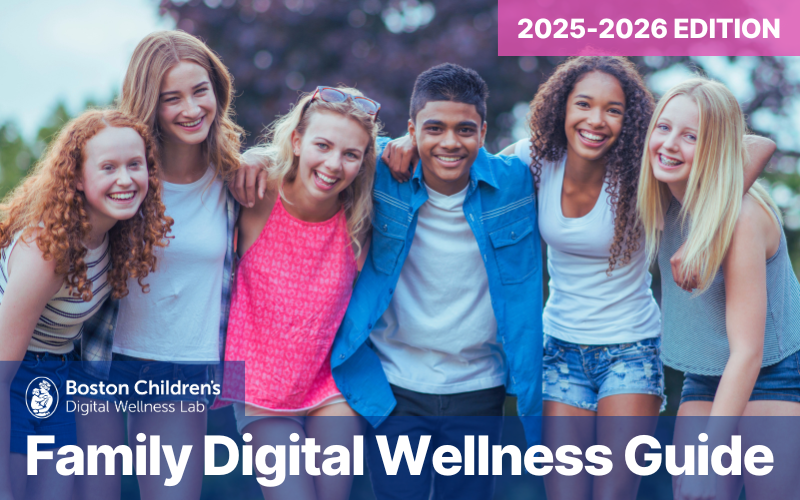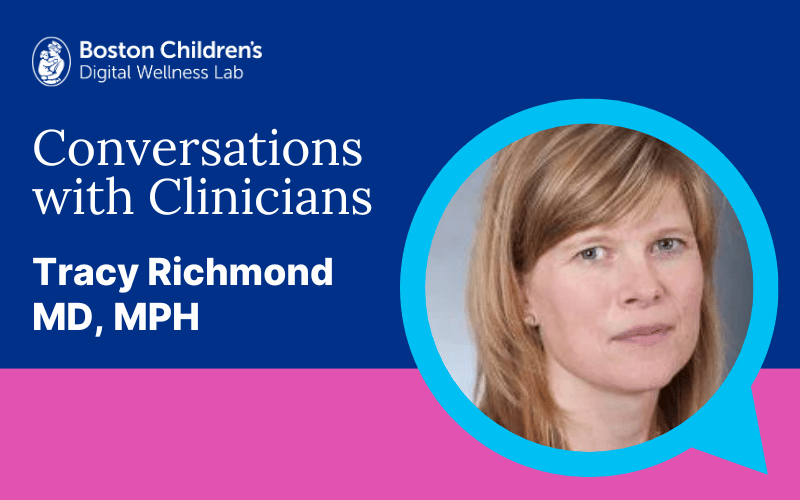Tracy Richmond, MD, MPH
Director, Eating Disorder Program, Boston Children’s Hospital
Director, Strategies for Teen Empowerment and Physical (STEP) Health Program, Boston Children’s Hospital
Co-Director, Avoidant Restrictive Food Intake Disorder (ARFID) Program, Boston Children’s Hospital
Attending Physician, Division of Adolescent/Young Adult Medicine
Associate Professor of Pediatrics, Harvard Medical School
What is your role at Boston Children’s Hospital?
I am a clinician/researcher. In my clinical practice, I treat patients with the full spectrum of weight-related concerns — from teens with higher weights to those with restrictive eating disorders. I also lead several weight-related programs including the Eating Disorder Program, the STEP program (a program for higher weighted youth, many of whom have disordered eating), and I co-lead the ARFID program. My research focuses on the social determinants and disease course of eating disorders as well as weight-related stigma.
What does a “day in the life” typically look like for you?
I have clinical days and then more research/administrative days. On a clinical day, I’m at our interdisciplinary training clinic that’s focused on patients with eating disorders. We have a pre-meeting with nutrition, mental health, and the medical providers, in which we talk about all of the patients we’re going to see that day. In the afternoon, I precept the fellows, our nurse practitioner, and one of our nurses while seeing patients – which involves a lot of preparation and reviewing of charts, as well as sitting with families, providing psychoeducation, and reviewing our assessments and treatment plans. On my research/administrative days, I review and triage patients along with my colleagues from psychology, and provide support to clinicians in the community who call with challenging cases. Some days I may give talks in the community or write papers.
What led you to this type of research, and this particular field of work, especially around eating disorders?
I first came to research primarily interested in racial and ethnic inequities in healthcare. In our fellowship program in Adolescent/Young Adult Medicine, we see a large caseload of patients with eating disorders. When I first started my training in the early 2000s, the majority of our patients were from the suburbs, mostly white, largely affluent. Over time, I’ve seen that population change. I found that I really enjoyed providing clinical care to the patient population with eating disorders. And gradually, my research interests dovetailed with my clinical interests. I think it’s an area that’s under-studied. There’s lots to do, lots to discover, and during the COVID pandemic, the numbers just went through the roof, leaving even more work to be done.
What are the greatest opportunities you see for kids that are growing up in a digitally saturated world?
A really interesting thing that we saw during the pandemic, unfortunately, were the negative impacts of social media on kids, because there were seemingly no guardrails. I was hearing lots of repetitive stories about influencers on TikTok or on Instagram who were encouraging behaviors like changing and counting your macros, cutting out sugar, limiting carbs, and things like that.
On the other hand, social media technologies are ways to connect, learn, and to find other people with similar interests. I think there is a real opportunity for the digital ecosystem to bring people together that might not intersect. An example of this, specific to my field, is Bryn Austin’s group, STRIPED (Strategic Training Initiative for the Prevention of Eating Disorders), which now has a youth arm of their work, with youth who are trained to do advocacy. These are youth from all over the country and the world who come together on Zoom. Before the pandemic, that just wouldn’t have been thought of as something that was acceptable. I think that’s where the opportunity is — bringing people with common interests together in ways that were not possible before.
What are the greatest challenges you see for kids that are growing up in a digitally saturated world?
The fact that kids are exposed to content without much vetting or filtering is a challenge. I think voices get elevated through social media in a way that is unprecedented. There was never a focus of organically growing your audience, and now social media allows a kind of homegrown, not vetted, “sort of celebrity” insights, exposing kids to ideas that in most cases wouldn’t stand up if they were vetted by an adult or expert community. Take for example, young kids and skincare routines. The rapidity and degree with which the peer-to-peer recommendations for skincare products spread is scary.
How would you change or redesign technology and media to be healthier for kids across the developmental span?
I’m a parent of three teenagers and I’ve found that it’s really hard to put constraints on their screen use. The main thing I want is for screens to not take up so much space in their lives — in my experience, they squish out creativity, boredom, and real life connectivity. I would like for interactive media to have guardrails with some ability to limit its scope and reach, rather than being like a sponge that keeps expanding and taking up all of the space. I want them to have time for things like creative endeavors and in-person relationships.
What guidance would you have for parents or caregivers to help their children build and maintain healthy behaviors with technology and digital media?
I would say don’t be afraid to go against the grain of what other parents are doing. I feel like I frequently hear “my child’s gonna miss out on something if they don’t have their phone all the time.” I think it’s appropriate to have limits at night and not let your child sleep with their phone. I also think it’s very appropriate up until at least the middle, if not later, teens to have an agreement that you can look at what they’re doing online. In my experience, many parents are completely unaware of the negative content their kids are being exposed to, which leaves them with no ability to combat its effects or even to have a conversation about it. Parents should feel empowered to set limits on the time that their child is on, or has access to devices, and they should always be checking in to see what the content is that their kids are actually viewing.
Anything else you’d like to share?
I just heard a great quote: giving your child social media is like “sending your kid off with a bunch of strangers into the world.” Remember, parenting is important. Don’t outsource it to social media.
Here at the Lab, we welcome different viewpoints and perspectives. However, the opinions and ideas expressed here do not necessarily represent the views, research, or recommendations of the Digital Wellness Lab, Boston Children’s Hospital, or affiliates.








